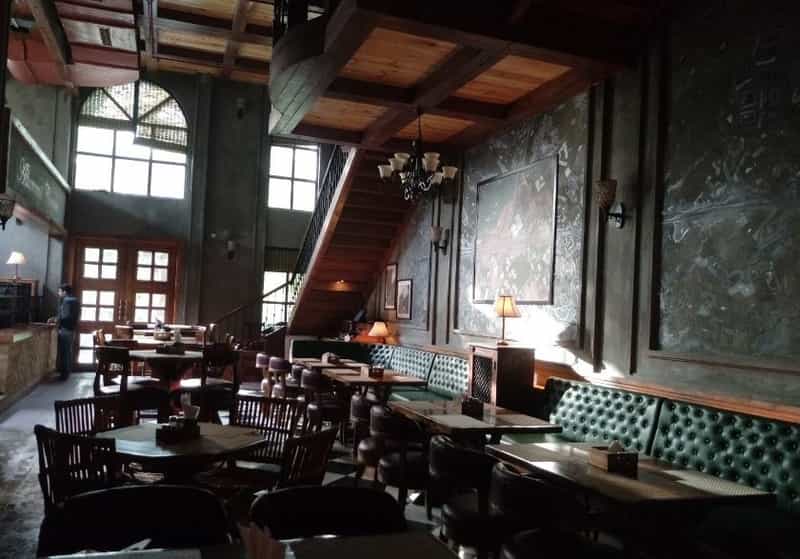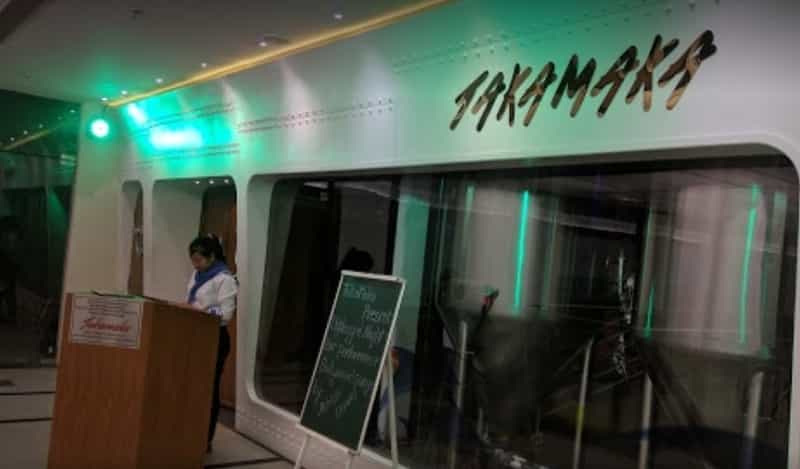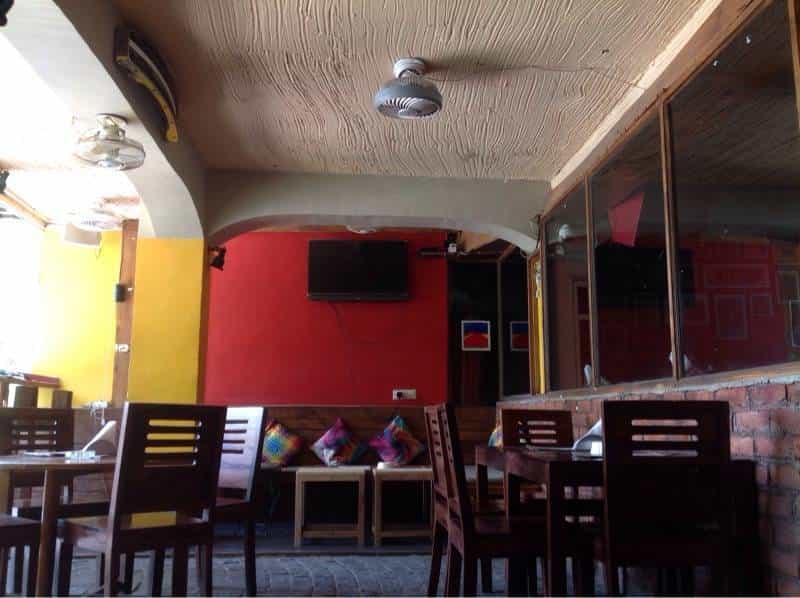Delhi’s vibrant nightlife and urban culture reflect in its café lounges. Trendy music, chic ambience, cosy interiors, great food and bar – these café lounges have it all. Whether you’re a college kid or a corporate person, the irresistible urge to have a drink or two with your pals is too hard to resist. This list of the best lounge in Delhi is sure you satiate your weekend urges.
With so many lounges in Delhi, it’s quite a task to find that perfect spot for hanging out with friends. To help you find the best café lounge in Delhi, we have come up with 5454 places, where you can enjoy yourself in the company of food and friends.
The Perfect Lounge List for Delhi
1. The Flying Saucer Cafe

The Flying Saucer Cafe (source)
Situated in Nehru Place, The Flying Saucer Café is a casual dining restaurant which serves Continental, Mediterranean and North Indian cuisines. It has a bar and smoking area, and outdoor seating too.
You can be sure of the best quality food and a wide variety of menu items to choose from. Live music, soothing ambience and interiors make your dining a memorable one.
- Address: Ground Floor, Epicuria Food Mall, Nehru Place Metro Station, Nehru Place, New Delhi.
- Zomato Rating: 4.2/5
- An average cost for two (with alcohol): Rs.1,600/- (approx.)
Suggested to Read : Cafes in South Delhi
2. Uncultured Cafe & Bar

Uncultured Cafe & Bar (source)
Rated among the finest resto-pub and lounges in Delhi, Uncultured Café and Bar caters to party goers and romantic couples. Its menu offers a wide range of Chinese, Italian, and Continental dishes.
There are an extensive liquor catalogue and Hookah varieties. Spacious seating for guests in the open terrace makes the perfect ambience for an enjoyable night out with friends.
- Address: HS-12, Kailash Colony, New Delhi
- Zomato Rating: 4.1/5
- An average cost for two (with alcohol): Rs.1,500/- (approx.)
Must Read : Best Cafe in Delhi
3. Lord of the Drinks

Lord of the Drinks (source)
In the bustling Connaught Place in the heart of Delhi, Lord of the Drinks is the place to be if you want finger-licking food and liquor of the finest quality. Rustic interiors and luxurious outdoors makes the whole atmosphere beckon you to experience drinking and dining in style.
Groovy music keeps your fingers tapping while you chat with your friends. A hit with teenagers, the lounge is great for partying with friends.
- Address: G-72, 1st Floor, Outer Circle, Connaught Place, New Delhi
- Zomato Rating: 4.2/5
- An average cost for two (with alcohol): Rs.2,200/- (approx.)
4. Hauz Khas Social

Hauz Khas Social (source)
In the urbane Hauz Khas, Hauz Khas Social is a vibrant all-day café and bar. The multi-cuisine menu has a wide variety of American and Continental dishes, which are served in their own unique and quirky style.
The place is famous for its wide choice of exotic cocktails and scintillating drinks. Amazing ambience and interiors, with a view of the lakefront, makes the ideal setting for an exciting dine-out with friends.
- Address: 9-A & 12, Hauz Khas Village, New Delhi
- Zomato Rating: 4.1/5
- An average cost for two (with alcohol): 1,300/- (approx.)
5. Molecule Air Bar

Molecule Air Bar (source)
There are many things why Molecule Air Bar differs from the rest. The lounge resembles a chemistry lab, food is served in the shape of chemistry lab objects, lighting is in the form of molecules, and even their menu is designed to look like a World War II memorabilia.
Their dishes are a mix of European, Mediterranean. Indian and Chinese cuisines, and are made using molecular gastronomy and liquid nitrogen. It’s a place of pure fusion food.
- Address: SCO 53, 4th Floor, Main Market, Sector 29, Gurgaon
- Zomato Rating: 4.1/5
- An average cost for two (with alcohol): 1,500/- (approx.)
6. Time Machine

Time Machine (source)
Few lounges in Delhi have made their mark as Time Machine in Noida. The lounge serves some amazing drinks and cocktails, and their menu is carefully designed to include a wide array of options from Italian, Indian, Continental, Chinese, and World Cuisine. Sparkling lighting, vibrant interiors and spacious outdoor seating, with live performances, sports screening, and dance floor add magic to the place.
- Address: 2nd Floor, Opposite Food Court, Gardens Galleria, Sector 38, Noida
- Zomato Rating: 4.2/5
- An average cost for two (with alcohol): 1,800/- (approx.)
Also Read : Romantic Restaurants in Delhi
7. Teddy Boy

Teddy Boy (source)
Walking into Teddy Boy in Connaught place is like going back to the times of post-world war UK. Dim lights, vibrant interiors, leather couches, funky artwork on walls, recreates the perfect British-era ambience. The food is a balanced mix of Indian and International cuisines.
A separate bar menu has an impressive range of wines, spirits, mocktails and cocktails. Live sports screening and a separate smoking area make the place a chill out zone.
- Address: N-86, 1st Floor, Outer Circle, Connaught Place, New Delhi
- Zomato Rating: 4.2/5
- An average cost for two (with alcohol): Rs.1,200/- (approx.)
8. Ambrosia Bliss

Ambrosia Bliss (source)
Located in Connaught Place, Ambrosia Bliss has a royal décor and flavorful food. Their menu has the best dishes of world cuisine.
Whether hanging out with friends or dining with family, Ambrosia Bliss will charm its way into your hearts with its courteous staff. A full bar with smoking area allows you to drink and smoke. And yes, it is kid-friendly, as well. So bring your kids along for a great dining experience.
- Address: 2nd Floor, L-51 to 54, Outer Circle, Connaught Place, New Delhi
- Zomato Rating: 4.2/5
- An average cost for two (with alcohol): 1,600/- (approx.)
9. Bombay Bar

Bombay Bar (source)
In Connaught Place, if you want to get a taste of Bombay and its iconic street foods, walk into Bombay Bar. This themed bar and lounge have a specially designed menu, with dishes named after the many landmarks of Bombay.
It includes foods from the famous Khao-galis of Bombay like Churchgate, Zaveri Bazar, Kharghar, Ghatkopar, to name a few. Savour sumptuous foods from Gujarati, Parsi, Irani and Kolhapuri cuisines.
- Address: P-21/90, 1st & 2nd Floor, Outer Circle, Connaught Place, New Delhi
- Zomato Rating: 4.2/5
- An average cost for two (with alcohol): Rs.1,600/- (approx.)
10. Ministry of Beer

Ministry of Beer (source)
Aesthetic design and bold interiors are the first things you notice when you walk into Ministry of Beer in Connaught Place. The bar lounge has 3 floors with mechanical parts, antique lights, Victorian furniture that looks straight out of some sci-fi movie.
The menu with dishes from world cuisine and a bar with steampunk décor and gothic design will transport you to a different world. Live DJ music, the dance floor will add excitement to your dining.
- Address: M 43, Outer Circle, Connaught Place, New Delhi
- Zomato Rating: 4.0/5
- An average cost for two (with alcohol): 1,500/- (approx.)
11. Marine Drivve- Club & Courtyard

Marine Drivve- Club & Courtyard (source)
Located in Rajouri Garden area of Delhi, Marine Drivve Club & Courtyard is a popular casual dining lounge for hanging out with friends or dining out with large families.
The menu has a variety of delicious foods from Indian, Chinese, Continental cuisines. Lavish décor, warm ambience, dazzling lights create an aura of elegance. There are a hookah zone and a bar with a variety of wines and liquor to choose from.
- Address: A-2, Vishal Enclave, Opposite Metro Pillar 412, Rajouri Garden, New Delhi
- Zomato Rating: 4.5/5
- An average cost for two (with alcohol): Rs.1,300/- (approx.)
Also Read : Disco in Delhi
12. Warehouse Cafe

Warehouse Cafe (source)
One of the most spacious lounge restaurants in Connaught Place, Warehouse Café has a vintage appeal. Its open terrace has spacious seating. Its menu has a wide range of dishes from American, Oriental, Lebanese, North Indian and European cuisines.
The menu is designed like a calendar, with a dish for each day of the year. The bar has a variety of alcoholic drinks and wines. There is a smoking area and hookah with different flavours.
- Address: D 19/ 20, D Block, Inner Circle, Near Rajiv Chowk Metro Station Gate No. 3, Connaught Place, New Delhi 110001
- Zomato Rating: 4.0/5
- An average cost for two (with alcohol): Rs.1,500/- (approx.)
13. DRAMZ Whiskey Bar & Lounge

DRAMZ Whiskey Bar & Lounge (source)
This resto-pub in Mehrauli is a sheer delight for whiskey connoisseurs. You get the finest selection of whiskey, exquisite wines from the world, alcoholic drinks, cocktails, and other exotic drinks.
Besides the bar, the food menu has signature delicacies from European and North Indian cuisines. The terrace commands a breathtaking view of the Qutub Minar. The rooftop ambience and seating in the open air gives a rich feel to your dining experience.
- Address: 1580/1, KD Marg, Near Qutub Minar, Mehrauli, New Delhi
- Zomato Rating: 3.9/5
- An average cost for two (with alcohol): Rs.3,000/- (approx.)
14. Game of Legends- Sports Bar, Grill & Lounge

Game of Legends- Sports Bar, Grill & Lounge (source)
Perfect for dining with friends and chatting over a chilled beer, Game of Legends – Sports Bar Grill & Lounge is a casual dining lounge and bar in Rajouri Garden. Sumptuous multi-cuisine food from Italian, Continental, Oriental, North Eastern, and North Indian cuisine will titillate your taste buds.
Live music, DJ, HD screens, Giant Projectors give entertainment to guests. Interactive games and happy hours appeal to guests who stay late for the night.
- Address: Level 3, City Square Mall, Rajouri Garden, New Delhi
- Zomato Rating: 3.4/5
- An average cost for two (with alcohol): Rs.1,450/- (approx.)
Also Read : Things to do in Delhi this Weekend
15. The Luggage Room Kitchen & Bar

The Luggage Room Kitchen & Bar (source)
Located in Connaught Place, The Luggage Room Kitchen and Bar has luggage in all its forms like baskets, boxes, suitcases, trunks, backpacks. The menu has foods from Italian, Continental and Chinese cuisines.
The drinks menu has all the usual hard liquor, cocktails and mocktails. Spacious seating, dance floor, live music, are the other facilities in this lounge bar.
- Address: M-39, Outer Circle, Connaught Place, New Delhi
- Zomato Rating: 4.5/5
- An average cost for two (with alcohol): Rs.1,400/- (approx.)
16. Lock & Key

Lock & Key (source)
Situated in Gurgaon, Lock & Key has a vintage feel to it. The rustic ambience feels even more realistic with live jazz performances. Spacious seating, well lit up décor seems to soothe the nerves and relax the body.
The menu has a wide range of American, North Indian and Continental dishes. It has a well-stocked bar with choices from fine spirits and wines. Its concept drinks are a special treat. It’s a place that is best for relaxing with friends over a couple of drinks.
- Address: Shop 105-107, 1st Floor, Cross Point Mall, DLF Phase 4, Gurgaon
- Zomato Rating: 4.2/5
- An average cost for two (with alcohol): Rs.1,800/- (approx.)
17. The Clock Tower

The Clock Tower (source)
Located in Gurgaon, The Clock Tower is a gastro-pub with elegant ambience and open terrace seating. The menu includes a whole range of Continental, North Indian, and Chinese cuisines.
The microbrewery, with its perfect lighting, creates a Victorian ambience and has a wide choice of spirits and wines. Live DJ, Dance Floor are the other facilities in this lounge.
- Address: Opposite South Point Mall, Near Rapid Metro Pillar 140, Golf Course Road, Gurgaon
- Zomato Rating: 4.4/5
- An average cost for two (with alcohol): Rs.2,800/- (approx.)
18. Kill The Bill

Kill the Bill (source)
The chic ambience of Kill The Bill makes it ideal for birthday parties and get-togethers. It has spacious seating and mouthwatering food. The menu has delicacies from Mughlai, Continental, North Indian and Chinese cuisines.
There is a good choice of wines, alcoholic drinks and mocktails. Live DJ, Dance Floor will keep the guests entertained while they party hard.
- Address: 1st Floor, F-14/15, Middle Circle, Connaught Place, New Delhi
- Zomato Rating: 4.2/5
- An average cost for two (with alcohol): Rs.1,200/- (approx.)
19. Immigrant Cafe

The Immigrant Cafe (source)
Located in Connaught Place, Immigrant Café is a beautiful dining café and lounge. It has classy interior and open-air seating.
The menu has foods from Italian, Oriental, North Indian and European cuisines. Its bar menu has impressive wines and other alcoholic and non-alcoholic drinks. There is live DJ and music, live sports screening and a smoking area.
- Address: B45, 1st Floor, Inner Circle, Connaught Place, New Delhi
- Zomato Rating: 4.2/5
- An average cost for two (with alcohol): Rs.1,000/- (approx.)
Also Read : Things to do in Delhi
20. Masabaa

Masabaa (source)
Finger-licking dishes and a lavish ambience make Masabaa stand out from others in Delhi. It has a multi-cuisine menu with dishes from Continental, Chinese, North Indian foods. Royal lighting and chandeliers give a luxurious feel to the place.
Spacious seating makes diners comfortable to spend their time here in the company of friends and family. It’s a fine dining experience with a choice of liquors and hookah.
- Address: Building 37, Club Road, West Punjabi Bagh, Punjabi Bagh, New Delhi
- Zomato Rating: 4.2/5
- An average cost for two (with alcohol): Rs.2,300/- (approx.)
21. PCO

PCO (source)
If you love American food and culture, then PCO in Vasant Vihar is your ideal destination. Entry to this bar is through a password which has to be punched in a make-believe phone booth. The menu has speciality dishes from American cuisine.
The luxurious décor creates a romantic ambience. There is a bar with liquors and cocktails and a smoking area. There is DJ and live music for entertaining the guests.
- Address: D-4, D Block Market, Vasant Vihar, New Delhi
- Zomato Rating: 4.3/5
- An average cost for two (with alcohol): Rs.2,200/- (approx.)
22. Takamaka

Takamaka (source)
Situated in Gurgaon, Takamaka is a multicuisine lounge and microbrewery with delicious comfort food from Italian, North Indian, Continental, Chinese and Mexican cuisines. It has its own microbrewery which makes beer and other spirits.
It recreates the world of luxury cruise travel, with its elegant décor and classy ambience. Other facilities include live music, smoking area, live sports screening and rooftop dining.
- Address: 1st Floor, The Palm Springs Plaza, Golf Course Road, Gurgaon
- Zomato Rating: 4.2/5
- An average cost for two (with alcohol): Rs.1,600/- (approx.)
23. Little After Dark

Little After Dark (source)
Located in Ghaziabad, Little After Dark is a pub lounge with classy décor and ambience. It offers a wide choice of delicious foods from Chinese, Continental and North Indian cuisines. Spacious outdoor seating lets you relax under the sky.
- Address: L Block, 2nd Floor, Indirapuram Habitat Center, Ahinsa Khand 1, Indirapuram, Ghaziabad
- Zomato Rating: 4.1/5
- An average cost for two (with alcohol): Rs.1,500/- (approx.)
Must Read : Things to do in Delhi at Night
24. Out of the Box

Out of the Box (source)
This bar and lounge in Rajouri Garden let you enjoy a wide array of foods from North Indian, Italian, Lebanese and Mexican cuisines. The vibrant ambience with live music performances keeps the guests entertained. The bar menu has an impressive range of wines, spirits, alcoholic and non-alcoholic drinks.
- Address: 2nd Floor, Vishal Enclave, C Block, Rajouri Garden, New Delhi
- Zomato Rating: 4.1/5
- An average cost for two (with alcohol): Rs.1,550/- (approx.)
25. Matchbox

Matchbox (source)
This resto-pub and lounge located in Hauz Khas Village have wood furnished décor and ambience. A multi-cuisine menu offers Foods from British, American, Continental cuisines.
It is a perfect hangout place for music fans as they enjoy the live music and karaoke. Its chic interiors and laid-back ambience let you relax with drinks and friends. For those who enjoy smoking, there is a smoking area.
- Address: 30, 1st Floor, Hauz Khas Village, New Delhi
- Zomato Rating: 4.3/5
- An average cost for two (with alcohol): Rs.1,700/- (approx.)
These lounges in Delhi are the favourite hanging out places for people of Delhi. If you too have something to share, do so in the comments section below. And if we may have missed anything from the list, tell us about it.
Book Treebo hotels in Delhi and get 100% guaranteed quality stay.























